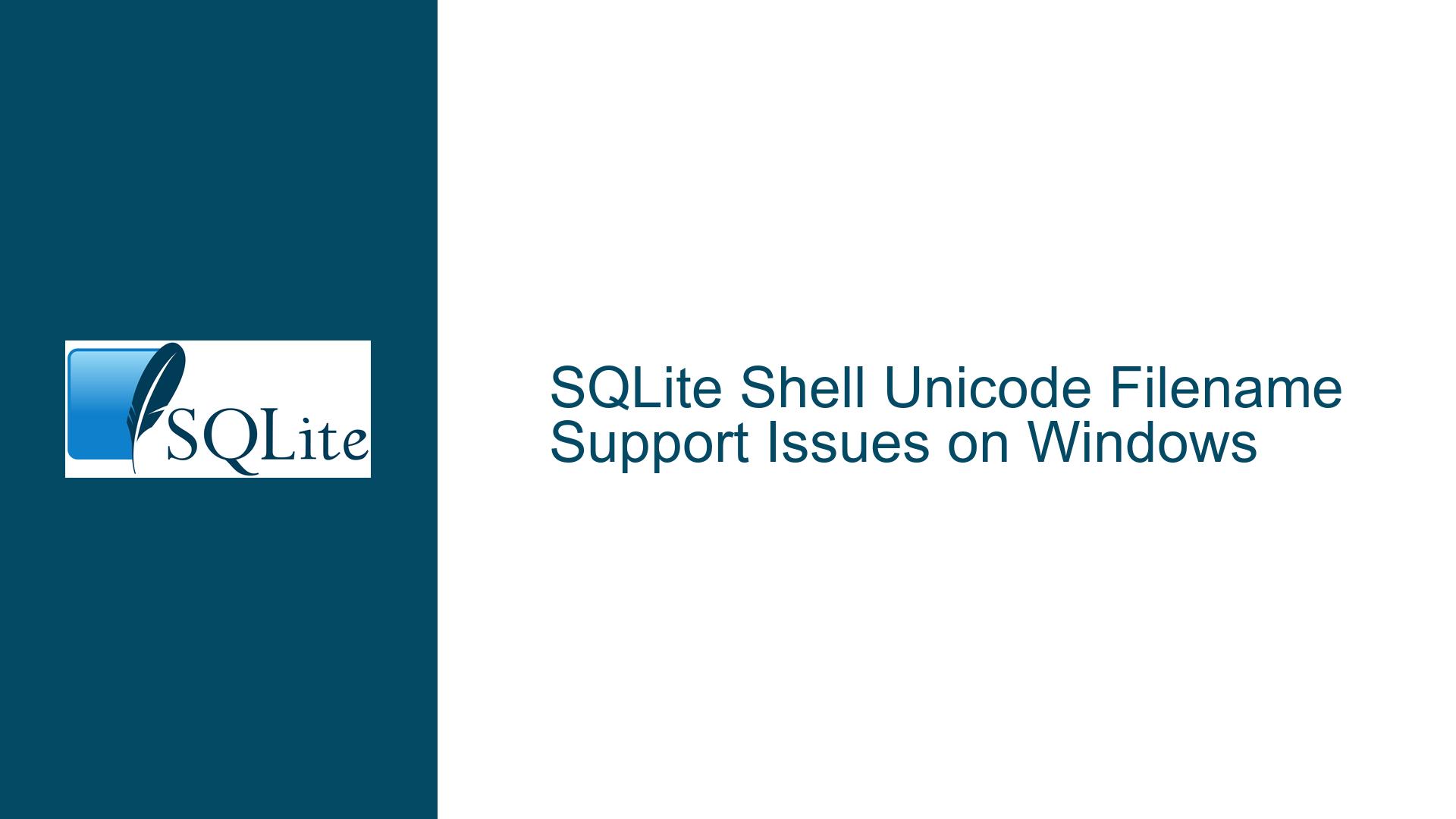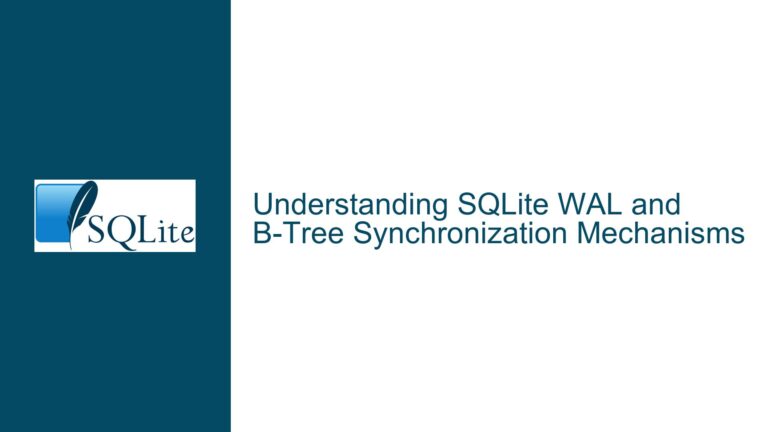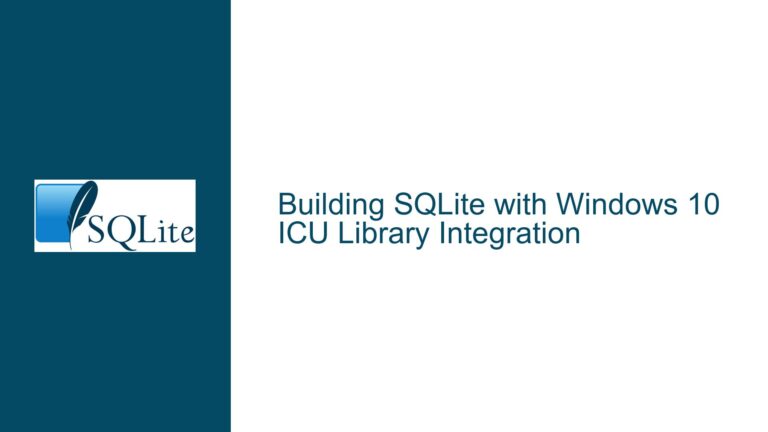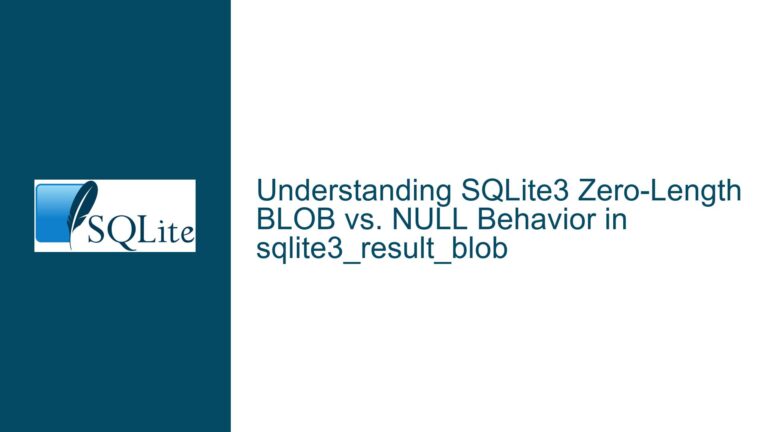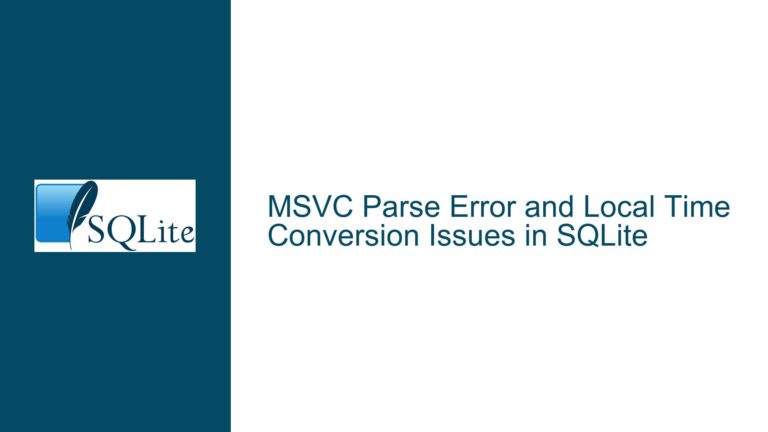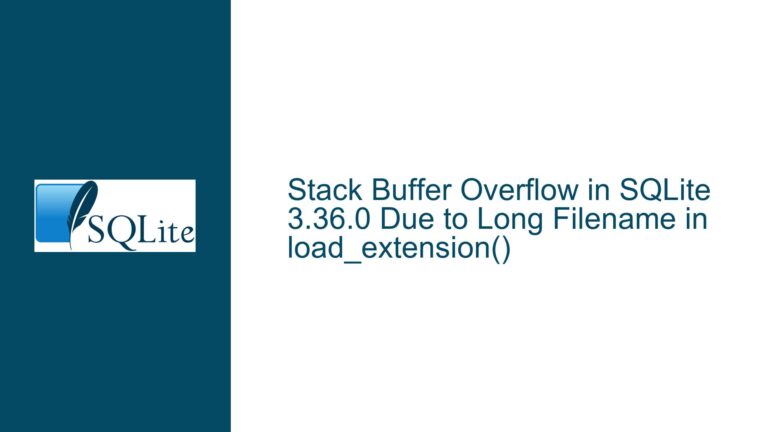SQLite Shell Unicode Filename Support Issues on Windows
SQLite Shell Fails to Open Unicode Filenames on Windows
The core issue revolves around the SQLite shell’s inability to properly handle Unicode filenames on Windows systems. When attempting to open a database file with a Unicode filename (e.g., ‘你好世界.db’), the SQLite shell either creates a new file with a mangled name (e.g., ‘�������.db’) or fails outright, claiming the filename is illegal. This behavior is particularly problematic for users who rely on Unicode characters in their filenames, such as those using non-Latin scripts or emojis.
The problem manifests in two distinct scenarios:
- When the Unicode characters in the filename can be represented in the current code page, the SQLite shell silently creates a new file with a corrupted name and operates on that file instead.
- When the Unicode characters cannot be represented in the current code page, the shell fails to open the file and reports an illegal filename error.
This issue is not merely a cosmetic inconvenience; it can lead to data integrity problems. For instance, if a user attempts to open a database file with a Unicode name, the shell might create a new, empty database with a corrupted name, leading to potential data loss if the user is unaware of the substitution.
The root of the problem lies in how the SQLite shell interacts with the Windows operating system’s file handling mechanisms. Despite the shell being Unicode-aware (as evidenced by its use of wmain()), the precompiled binaries provided on the official SQLite website do not fully support Unicode filenames. This discrepancy suggests that the Unicode support may not have been compiled into the official binaries, or that there are underlying issues with how the shell processes command-line arguments containing Unicode characters.
ANSI API Usage and Code Page Mismatches
The primary cause of this issue is the SQLite shell’s reliance on the ANSI versions of Windows API functions, which do not natively support Unicode filenames. When the shell attempts to open a file with a Unicode name, it converts the filename to the current code page, leading to the observed corruption or failure.
Windows uses a variety of code pages to handle character encoding, and the default code page for the console (cmd.exe) is typically not UTF-8. This mismatch between the shell’s internal UTF-8 encoding and the console’s code page results in the filename being misinterpreted. For example, if the console is using code page 437 (OEM United States), any Unicode characters outside this range will be replaced with placeholder characters (e.g., ‘?’), leading to the creation of a new file with a corrupted name.
The chcp 65001 command, which sets the console’s code page to UTF-8, is often suggested as a workaround. However, this solution is not universally effective. On older versions of Windows, such as Windows XP, the chcp 65001 command may not be supported at all. Even on modern systems like Windows 10, changing the code page does not resolve the issue when the database file is opened by dragging it onto the SQLite shell icon, as the code page change only affects the current console session.
Furthermore, the problem is exacerbated by the way Windows handles command-line arguments. When a file is dragged onto the SQLite shell icon, the filename is passed to the shell via the argv array. If the shell is not compiled to handle Unicode argv values, it will misinterpret the filename, leading to the observed failures. This issue is not unique to SQLite; many Windows applications face similar challenges when dealing with Unicode filenames.
Compiling SQLite Shell with Full Unicode Support
The most effective solution to this problem is to compile the SQLite shell with full Unicode support. This involves modifying the source code to ensure that the shell uses the Unicode versions of Windows API functions and properly handles Unicode command-line arguments.
To achieve this, the following steps are necessary:
- Modify the
SQLITE_SHELL_IS_UTF8Definition: Theshell.cfile contains a block of code that defines theSQLITE_SHELL_IS_UTF8macro. By default, this macro is set to 0 (indicating no UTF-8 support) only for MSVC compilers on Windows. To enable Unicode support for other compilers, such as GCC, this block should be modified as follows:
#ifndef SQLITE_SHELL_IS_UTF8
# if (defined(_WIN32) || defined(WIN32)) && (defined(_MSC_VER) || (defined(UNICODE) && defined(__GNUC__)))
# define SQLITE_SHELL_IS_UTF8 (0)
# else
# define SQLITE_SHELL_IS_UTF8 (1)
# endif
#endif
This change ensures that the SQLITE_SHELL_IS_UTF8 macro is set to 0 for both MSVC and GCC compilers when targeting Windows, provided that the UNICODE macro is defined.
Compile with Unicode Support: When compiling the SQLite shell with GCC, the
-municodeflag must be used to ensure that the resulting binary uses the Unicode versions of Windows API functions. For MSVC, no additional flags are required, as the compiler automatically handles Unicode support when theUNICODEmacro is defined.Use a Unicode-Aware Console: Even with a Unicode-enabled SQLite shell, the console used to run the shell must also support Unicode. Modern terminals like Windows Terminal (available on Windows 10) provide better Unicode support than the traditional
cmd.exe. However, as of the time of writing, Windows Terminal does not support dragging and dropping files with Unicode names, which limits its usefulness in this context.Alternative Approaches: For users who cannot or do not wish to compile the SQLite shell from source, alternative approaches include:
- Using a different database management tool that fully supports Unicode filenames.
- Renaming database files to use only ASCII characters, though this is not a viable solution for all users.
- Running SQLite under a Unix-like environment on Windows, such as WSL (Windows Subsystem for Linux), which provides robust Unicode support.
In conclusion, the issue of Unicode filename support in the SQLite shell on Windows is a complex one, rooted in the interplay between the shell’s internal encoding, the Windows API, and the console’s code page. While the chcp 65001 command offers a partial workaround, the most reliable solution is to compile the SQLite shell with full Unicode support. This ensures that the shell can handle Unicode filenames correctly, regardless of the console’s code page or the method used to open the file.
